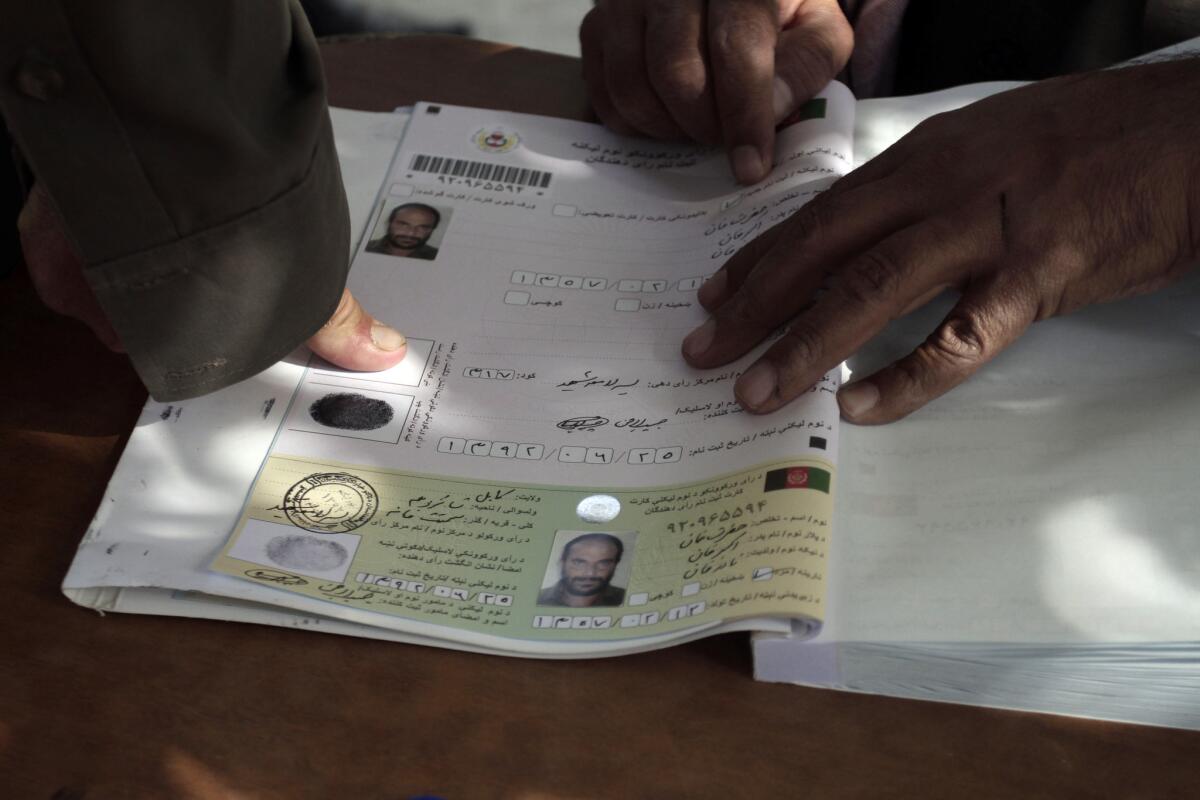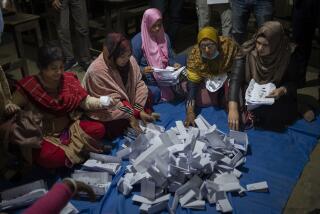Gunmen slay Afghan election official in run-up to 2014 balloting

KABUL, Afghanistan -- Two Taliban gunmen on a motorcycle issued a cheery morning greeting Wednesday to Amanullah Aman, head of the Independent Election Commission in Kunduz province, then opened fire and killed him, raising fears of protracted violence in the run-up to next year’s Afghan general election.
“Aman was shot with three bullets in the chest,” said Enayatullah Khaliq, spokesman for the governor of Kunduz. “He was taken to the hospital, where he died an hour later.”
The Taliban claimed responsibility for the attack in a telephone call from spokesman Zabiullah Mujahid.
In August, the group’s shadowy leader, Mullah Mohammed Omar, sent a message to the Afghan people decrying the elections and vowing to continue their armed campaign until foreign troops leave the country. International forces are scheduled to withdraw in late 2014, although a core of training, intelligence and other military personnel are expected to remain.
Hamdullah Danishi, deputy governor for Kunduz, said that at the time of the attack Aman was collecting rents from shopkeepers in an area where he owns property. Danishi added that the Taliban has been after the elections official for a while.
Aman, the first member of the commission to be assassinated since the panel started gearing up in May for the election, started working in 2004 during the first presidential election held after the U.S.-led invasion.
The general election is scheduled for April 5. The three-week registration period for candidates opened Monday, although no one has yet stepped forward.
The killing comes four days after a similar attack in which two gunmen on a motorcycle killed a police logistics officer in Kunduz city, the provincial capital.
Analysts said Wednesday’s attack dovetails with the Taliban’s broader intimidation campaign. “It’s part of their strategy to disrupt the elections,” said Abdul Wahid Taqat, a Kabul-based military and political analyst. “This is what terrorists do, increase fear among ordinary Afghans in order to reach their strategic goals.”
The 2014 vote is seen as a litmus test for the government as it attempts to bolster its legitimacy in the face of reduced foreign support and a resurgent insurgency, which has attacked polling stations and disrupted campaigning in the past.
Earlier this month, the election commission determined that 3,410 of the nation’s 6,845 polling stations face “notable” security concerns, including 259 in areas under militant control. In the 2009 presidential election, 800 of the estimated 7,000 polling centers never opened because of safety concerns.
Analysts said the Taliban is keen to portray the government as corrupt, weak and lacking the police and military muscle to safeguard national security, let along the safety of voters headed to the polls.
“We all understand that the government can’t carry out elections throughout the country,” Taqat said. “Even some government officials are boycotting the elections.”
An added election concern is a shortage of female security officers, which could discourage women from voting. The election commission said last month that only 2,000 of the 12,000 women required were available to conduct searches outside polling stations earmarked especially for women.
Presidential elections are held every five years, and candidates must be Afghan citizens at least 40 years old who have not been convicted of war crimes or have a criminal record. Media speculation has focused on Foreign Minister Zalmai Rassoul, opposition leader Abdullah Abdullah, former Finance Minister Ashraf Ghani Ahmadzai and lawmaker Abdul Rab Rasoul Sayyaf. None have thrown a hat in the ring.
Approximately 18 million of Afghanistan’s 30 million people are eligible to vote. The last presidential election was marred by numerous allegations of fraud, and some analysts said they’re bracing for more irregularities next year.
Taqat said he was recently approached by someone who said he had 40,000 voting cards and was looking for someone to pay him $30 apiece. “We have experts and skilled officials working at the Independent Election Commission, but without overall security we can’t have fair and transparent elections,” he said.
In a recent survey of 1,927 adults in five provinces including Kabul, 78% of respondents said they thought elections were the best way for a leader in Afghanistan to assume power, compared with 6% who favored naming a religious leader to create an “Islamic emirate,” and 8% who supported a loya jirga, a traditional gathering of elders, as a consensus process.
In other developments, five Pakistanis were killed and over a dozen injured in Afghanistan, just across the border from Zhob, a town in Pakistan’s restive western Baluchistan province, when Afghan forces fired on them Wednesday morning, according to a Pakistani border security official who declined to give his name.
“These were Pakistanis trying to cross the border,” he said in a telephone interview. “It is usual for villagers living on both sides to cross the border. No Pakistani security official was killed in the firing.”
But Pakistan’s Foreign Ministry said in a statement that the deaths occurred in Pakistan and that it had lodged a strong protest after Afghan forces fired across the border near the Pakistani village of Godwana, resulting in the five deaths.
Pakistan urged Kabul to conduct an inquiry and “prevent the recurrence of such incidents, which are detrimental to friendly relations and undermine goodwill between the two brotherly countries.”
ALSO:
Greek public workers strike over austerity layoffs
Israeli commander predicts that Assad will last for years
Anyone lose a $6.3-million winning lottery ticket in Spain?
Twitter: @MarkMagnier
Special correspondent Baktash reported from Kabul and Times staff writer Magnier reported from New Delhi. Nasir Khan in the Times’ Islamabad bureau contributed to this report.
More to Read
Start your day right
Sign up for Essential California for news, features and recommendations from the L.A. Times and beyond in your inbox six days a week.
You may occasionally receive promotional content from the Los Angeles Times.






